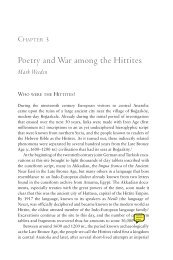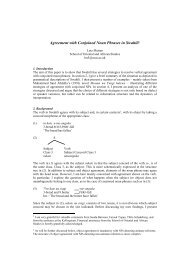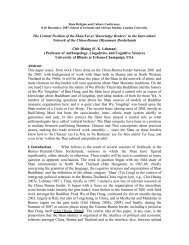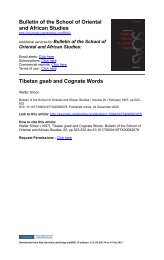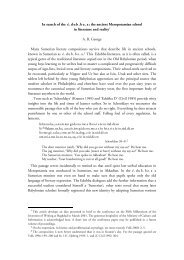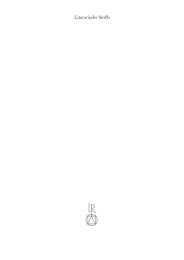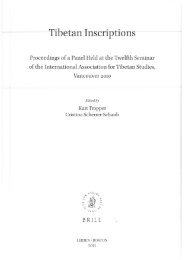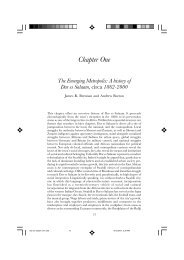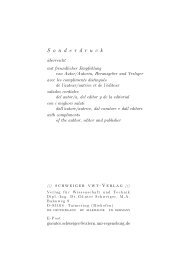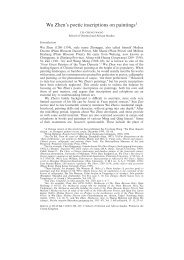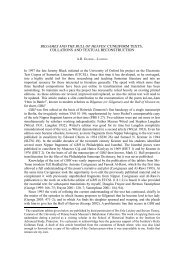000_JLC3_debut_FL - SOAS Research Online
000_JLC3_debut_FL - SOAS Research Online
000_JLC3_debut_FL - SOAS Research Online
You also want an ePaper? Increase the reach of your titles
YUMPU automatically turns print PDFs into web optimized ePapers that Google loves.
26 G. Tucker Childs<br />
would enlist the men they conquered as soldiers or slaves. Furthermore, speakers of Mande<br />
languages kept aloof; they were reluctant to assimilate fully to the resident culture, especially<br />
those who followed Islam. Finally, Mande speakers were superior in that they typically lived<br />
in towns, and even founded a few towns themselves.<br />
The cultural effects of Mande contact and superiority can similarly be characterized. The<br />
power associations they installed and controlled (with themselves at the top) were one<br />
instantiation of the hierarchical social structure replacing the flatter, more egalitarian<br />
structures traditionally found among Atlantic peoples (Fairhead et al. 2003). Various cultural<br />
artifacts and institutions were introduced, for example the marabouts or morimen. The switch<br />
from matrilineal to patrilineal societies is another result (Niane 1989). These examples all<br />
attest to the overweening influence of Mande culture on the Atlantic peoples. The influence<br />
also extends to language.<br />
Linguistically the groups have been said to be typological opposites (e.g. Wilson 1989),<br />
but that statement needs revision in light of current findings (Childs 2002, 2004a), much of<br />
which was reported at a recent workshop (“Documenting convergence and diversity – Mande<br />
and Atlantic languages in contact”, <strong>SOAS</strong>, University of London, September 6-9 2008).There<br />
are shared features which are attributable to contact, of the sort characterized socioculturally<br />
above. There have been intense periods of contact, and because of the asymmetrical control of<br />
power and resources, the influence has gone largely one way, from Mande languages to<br />
Atlantic languages. Thus, in the Mande-Atlantic interactions we see many of the results of<br />
contact found elsewhere on the continent. What makes this case particularly informative is<br />
that it takes place independently of European contact and thus could be representative of other<br />
unreported, totally African phenomena.<br />
The general consequences of these socio-historical factors can be seen in a number of<br />
changes in these languages, as well as in the march towards language death by many of<br />
Atlantic’s members. I begin by looking in detail at borrowings into Kisi.<br />
2.2. Linguistic effects<br />
In Kisi one can speak of both micro- and macro-linguistic effects. The former include<br />
specialized vocabulary in such areas as war-medicine, political divisions and positions, and<br />
power societies. The macro-linguistic effects include bilingualism, language maintenance<br />
with interference, and language shift. One obvious effect is the nature of the borrowing that<br />
has taken place. I have looked in detail at this phenomenon only in Kisi, but I can add to this<br />
statement some observations about what has happened to the three dying languages Mani,<br />
Kim, and Bom.<br />
2.2.1. Borrowing<br />
The semantics of the words borrowed from Mande into Kisi reflects the nature of the<br />
contact and supports what little we know of the history of the area. It also says something<br />
about how relations have changed since the advent of the Mandeng horse warriors.<br />
Kisi has borrowed over 200 words from Mande in a Kisi lexicon of 5800 words (3.5%),<br />
from which count proper nouns (people and towns) have been excluded. Specific examples<br />
and many more details can be found in Childs 2002 and Childs 2004b. Most borrowings are<br />
nominals but some are verbs, connectives, and bound morphemes. Somewhat controversially<br />
S-Aux-O-V word order has been said to have been borrowed (Güldemann 2008, questioning<br />
Childs 2004; Hyman 2010). Semantic borrowings include some “basic vocabulary”, but most<br />
borrowings are in the areas of politeness formulae, family relations, political organization,<br />
commerce and trade, and religion.<br />
The generalization characterizing the pattern of borrowings is that contact with speakers of<br />
Mande languages was accompanied by some complexification of life—Kisi society became<br />
much less “local” as roles and interactions increased. The Kisi were exposed to life beyond<br />
the confines of the village or hamlet (see Paulme 1954).<br />
Journal of language contact – THEMA 3 (2010)<br />
www. jlc-journal.org



